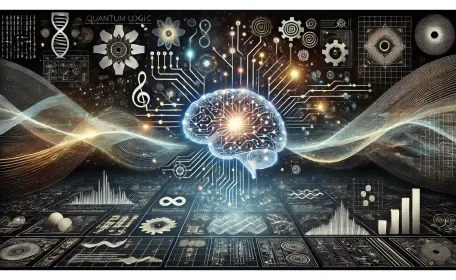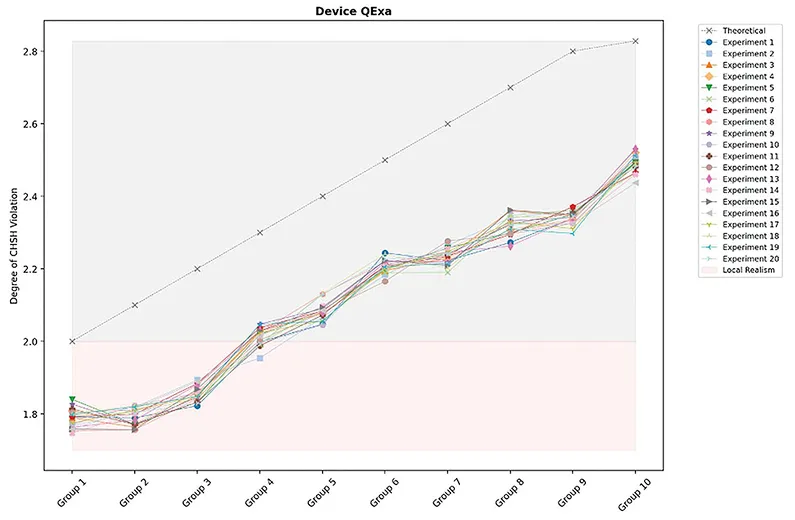Bridging quantum logic, artificial intelligence, and quantum computation
The “second quantum revolution” was central to the Fellowship, focusing on quantum logic's impact across disciplines. The research bridged quantum physics with machine learning, AI, cognitive science, and biomedical diagnostics. Key outcomes included new algorithms, quantum computer benchmarking, and interdisciplinary dialogue through seminars and collaboration with the Leibniz Supercomputing Centre.

Focus Group: Quantum Logic and the Second Quantum Revolution
Prof. Roberto Giuntini (University of Cagliari), Alumnus Philosopher in Residence (funded by the TÜV SÜD Foundation and as part of the Excellence Strategy of the federal and state governments) | Hosts: Prof. Hans Bungartz, Prof. Stefania Centrone, Prof. Klaus Mainzer (TUM)
Scientific concept and goals
Over the course of six visits to the TUM-IAS, spanning more than six months in total, I investigated the concept of “quantumness,” a defining feature of quantum systems characterized by phenomena such as superposition, entanglement, non-locality and contextuality. The project aimed to apply quantum logic to disciplines beyond physics, including machine learning, data science, and biomedical diagnostics. The research expanded to include the intersection of artificial intelligence (AI) and quantum sciences. This included exploring how large language models (LLMs) could benefit from quantum principles, providing a framework for advancing quantum-inspired computational tools.
Summary of the work carried out

Seminar series highlights
The seminar series (Quantumness: From Logic to Engineering and Back), organized with my Hosts, was a cornerstone of the Fellowship, fostering rich interdisciplinary dialogue. The proceedings of these seminars will be published, edited by H. Bungartz, S. Centrone, R. Giuntini, M. Molls and K. Mainzer, in the prestigious “Synthese Library” series under the title Quantum Logic and Beyond.
Key seminars included:
First Quantum Afternoon (December 6, 2023): Prof. Giuseppe Sergioli presented “Quantum State Discrimination for Supervised Classification,” showcasing quantum logic’s application in machine learning. Prof. Christian Mendl provided insights into quantum simulations for analyzing complex systems.
Computing Systems: Mathematical Entities or Physical Objects? (March 15, 2024): Prof. Marco Giunti explored the dual nature of computational systems and its philosophical implications for quantum research.
Second Quantum Afternoon (May 16, 2024): Profs. Robert Wille and Klaus Mainzer examined automation in quantum computing design and the interplay between AI and quantum technologies.
Quantum Logic as a Logic (May 21, 2024): My lecture traced the evolution of quantum logical frameworks, complemented by Prof. Francesco Paoli’s analysis of contradictions within quantum logic.
From Known Knowns to Unknown Unknowns in AI: Historical and Technical Issues (June 5, 2024): Prof. Fabio Roli explored AI’s shift from solving well-defined problems to addressing adversarial challenges, emphasizing adversarial machine learning’s role in enhancing safety and tackling security threats.
Leibniz Quantum and Beyond (September 9, 2024): This seminar explored the intersection of philosophy, medicine, and contemporary physics, highlighting contributions from Leibniz’s theoretical frameworks to contemporary advancements in science and technology.
Collaboration with Leibniz Supercomputing Centre (LRZ)
The collaboration with LRZ was instrumental in achieving the Fellowship’s goals. The Quantum Cagliari QExa20 project, initiated during this period, focused on benchmarking quantum processors and noise characterization. These efforts addressed critical challenges in quantum device certification and reliability.
Conference: With Novel Nuclear Technologies Towards a Greenhouse Gas-Free Basic Energy Supply
I participated in the Working Group IV, Energy Economics and Society, as part of the conference With Novel Nuclear Technologies Towards a Greenhouse Gas-Free Basic Energy Supply, held at the TUM Science and Study Center Raitenhaslach from June 13 to 15, 2024. This event was organized by the TUM Senior Excellence Faculty under the patronage of Bavarian State Minister Dr. Florian Herrmann. During this conference, I also contributed a paper titled “Categorizing the Risks” (see the publication list).
Figure 1

Educational initiatives
With Prof. Giuseppe Sergioli, I designed the course Quantum Information Meets Artificial Intelligence, subsequently taught at TUM by Prof. Sergioli as part of the courses offered by the Chair of Philosophy and Theory of Science of Prof. Stefania Centrone. The course introduced students to interdisciplinary concepts, bridging quantum sciences and AI, and underscored the Fellowship’s commitment to fostering the next generation of researchers.
Major outcomes and significance
Applications of quantumness and contributions to quantum computing
This research, originally grounded in foundational and philosophical inquiry, has led to significant advancements with direct applications to quantum benchmarking and computing. The work has demonstrated that theoretical principles of quantum logic and fundamental physics are not only conceptually profound but also essential for evaluating the performance of near-term quantum processors. Our results have laid the groundwork for assessing the ability of quantum computers to achieve the so-called quantum supremacy, a crucial milestone in the field. The developed methodologies provide essential tools for benchmarking quantum hardware, ensuring their reliability, and optimizing their computational potential. In particular, the research efforts during the Fellowship led to significant advancements in the following areas:
Classification of Quantum Correlations (Fig. 1), including the entanglement of pure and mixed states in near-term quantum computers. This work involved collaboration with the research group of Dr. Luigi Iapichino (Leibniz Supercomputing Center) and with Carla Rieger (TUM, CERN);
improved understanding of quantum non-locality and its role in enhancing computational efficiency and scalability [1];
non-locality benchmarking for certification: developed a certification protocol based on non-locality benchmarking techniques to evaluate quantum processors’ ability to generate genuine multipartite non-local states; integration with quantum random circuits: created a software tool for generating quantum random circuits, supporting benchmarking and analysis of resources such as entanglement and quantum magic across various quantum processors.
Figure 2

Quantum-inspired machine learning
framework for quantum multi-class classifiers leveraging quantum state discrimination techniques. This research demonstrated that these classifiers can be implemented on near-term quantum computers after the classification functions are "distilled" on classical platforms from the quantum-encoded training data (Fig. 2);
development of Python packages aimed at optimizing algorithms for quantum-inspired machine learning. This work involved collaboration with David Schneller and Carlo Cuccu: algorithms, bridging theoretical innovation with practical applications. This software will be published on GitHub;
biomedical microscopy imaging: the application of quantum-inspired methods in microscopy imaging has led to significant advancements in image recognition and analysis. Building upon the work presented [2], new algorithms were implemented to extract and classify complex patterns in microscopic clonogenic assay evaluation. This important technique quantifies the survival rate of in vitro cell cultures based on the ability of a single cell to grow (cell proliferation) and form a colony. It is used to determine the number and size of cell colonies in vitro after irradiation or drug administration.
Integration with artificial intelligence∫: in the last part of the research period, we started a research line aiming at integrating quantum principles with artificial intelligence, particularly focusing on quantum data processing and natural language understanding.
Quantum logic as a logic
Building on foundational discussions, this research examined also the emergence of contradictions in the logic of quantum systems mathematically interpreted according to the rules of the so-called “unsharp approach to quantum mechanics.” The transition from sharp to unsharp logic emphasizes the necessity of accommodating contradictory information within quantum mechanics. The results hold both philosophical and computational significance, opening pathways for developing advanced (holistic) logical systems to manage quantum complexities.
Philosophical leadership
My election as Corresponding Member of the Académie Internationale de Philosophie des Sciences (AIPS) and Ordinary Member of the European Academy of Sciences and Arts reflects the Fellowship’s recognition in global academic circles and underscores the integration of philosophical inquiry with cutting-edge science.
Future directions
Short-term goals
Organizing a summer school on Quantum and AI with Prof. Stefania Centrone and Deutsches Museum.
Hosting a TUM-IAS / University of Cagliari meeting in April 2025 to strengthen the collaborations between the University of Cagliari, the TUM-IAS, and TUM.
Deepening ties with TUM researchers involved in quantum sciences.
Long-term goals
Expanding research on quantum machine learning, quantum cognition, and AI.
Leveraging quantum technologies for sustainable solutions to global challenges.
Conclusion
The TUM-IAS Philosopher in Residence Fellowship provided a unique platform to bridge philosophical inquiry and cutting-edge science, resulting in significant advancements in quantum logic, computation, and AI. These outcomes underline the transformative potential of interdisciplinary research in addressing contemporary scientific and societal challenges.
This research was carried out with the collaboration of: Prof. Maria Luisa Dalla Chiara (University of Florence), expert in quantum logic and philosophy of science; Prof. Giuseppe Sergioli (University of Cagliari), specializing in quantum information and machine learning; Prof. Fabio Roli (University of Genoa), expert in adversarial machine learning; Prof. Federico Holik (University of La Plata), specializing in quantum correlations; David Schneller, who contributed to the development of Python packages for quantum-inspired machine learning; Carlo Cuccu, focused on optimizing machine learning algorithms at TUM; Carla Rieger, expert in the classification of quantum correlations and entanglement.
[1]
Granda Arango, A. C., Holik, H. F., Sergioli, G., Giuntini R. & Freytes H. Geometrical aspects of resources distribution in quantum random circuits. (arXiv.2405.01650);
Sergioli, G., Granda Arango, A. C., Cuccu C., Centrone S., Rieger C. & Giuntini R. Classification of quantum correlations via quantum-inspired machine learning. (Submitted to Quantum Machine Intelligence).
[2]
Sergioli, G. et al. A quantum-inspired classifier for clonogenic assay evaluations. Scientific Reports 11 (2021)
(DOI: http://doi.org/10.1038/s41598-021-82085-8).
Selected publications
- Giunti, M., Garavaglia, F. G., Giuntini R., Sergioli G. & Pinna S. ChatGPT as a Prospective undergraduate and medical school Student. PLOS ONE 19(10). 1–31 (2024) (DOI: https://doi.org/10.1371/journal.pone.0308157).
- Massri, C., Bellomo, G., Freytes, H., Giuntini R., Sergioli, G. & Bosyk, G. M. LOCC Convertibility of entangled states in infinite-dimensional systems. New Journal of Physics 26 (2024) (DOI: http://doi.org/10.1088/1367-2630/ad503d).
- Dalla Chiara, M. L., Giuntini, R. & Sergioli, G. A Quantum approach to pattern recognition and machine learning. Part I. International Journal of Theoretical Physics. 63(55) (2024) (DOI: http://doi.org/10.1007/s10773-024-05566-2).
- Dalla Chiara, M. L., Giuntini, R. & Sergioli, G. A Quantum approach to pattern recognition and machine learning. Part II. International Journal of Theoretical Physics. 63(55) (2024) (DOI: http://doi.org/10.1007/s10773-024-05566-2).
- Giuntini, R., Ledda A. & Vergottini G. Generalizing orthomodularity to unsharp contexts: properties, blocks, residuation. Logic Journal of the IGPL. jzae076 (2024) (DOI: https://doi.org/10.1093/jigpal/jzae076).
- Giuntini, R. & Sergioli G. Categorizing Perceptions of Dangers and Risks: A Philosophical Perspective (to be published in the Proceedings of the Conference With Novel Nuclear Technologies Towards a Greenhouse Gas-Free Basic Energy Supply).